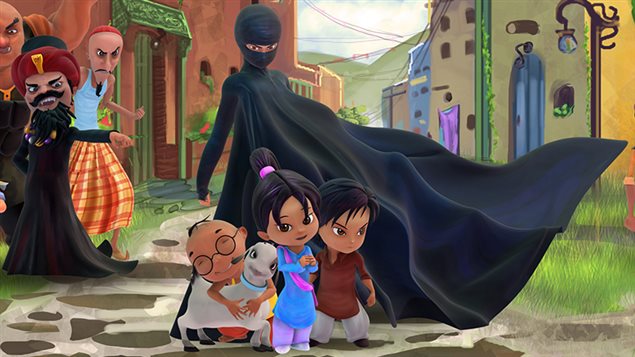Don't Mess With The Lady In Black
-

Burqa-clad female cartoon superhero triggers a debate about her costume
ISLAMABAD - Cartoon fans in Pakistan have been excited by the arrival of the country's first caped crusader, in the form of a female superhero who flies through the air, battling villains using pens and books.
The heroine, Burka Avenger, is certainly an unusual role model for female empowerment in Pakistan: a woman who uses martial arts to battle colourful villains such as Baba Bandooq, a Taleban-esque figure who tries to shut down her school, and Vadero Pajero, a corrupt politician.
But the cartoon, in which a demure schoolteacher, Jiya, transforms into the action heroine by donning a burqa, or traditional cloak that covers the body, has also triggered an awkward debate about her costume.
"Is it right to take the burqa and make it look 'cool' for children, to brainwash girls into thinking that a burqa gives you power instead of taking it away from you?" asked the novelist and commentator Bina Shah in a blog post.

The criticism has not overshadowed the broader welcome that Burka Avenger, which aired here for the first time on Sunday evening, has received.
With slick computer animation, fast-paced action and flashes of humour that even adults can appreciate, the character could offer Pakistanis a new cultural icon akin to Wonder Woman in the United States. The Urdu language show is the brainchild of one of Pakistan's biggest pop stars, Mr Aaron Haroon Rashid, who conceived it as a way to emphasise the importance of girls' education and teach children other lessons, such as protecting the environment and not discriminating against others.

The burqa debate centres on whether her use of the all-covering cloak - albeit a more streamlined version of the one usually seen in Pakistani villages - is subverting a traditional symbol of segregation and oppression or reinforcing it.
Mr Rashid, who is certainly no radical Islamist, said he used a burqa to give a local feel to the show, which is billed as the first animated series ever produced in Pakistan.
"It's not a sign of oppression. She is using the burqa to hide her identity like other superheroes," he said. "Since she is a woman, we could have dressed her up like Catwoman or Wonder Woman, but that probably wouldn't have worked in Pakistan."
The Burka Avenger character has obvious parallels with Malala Yousufzai, the 16-year-old Pakistani schoolgirl who was shot by Taleban gunmen last year for advocating education for girls and who recently addressed a seminar at the United Nations headquarters in New York.
Mr Rashid said work on the show had already started when Malala was shot. But the attack on her only highlighted the importance of protecting girls' education, a major theme of the show.
"Malala is a very brave girl, and her speech at the UN was spectacular and wonderful," he said. "There has been a lot of criticism of her in Pakistan which I can't understand."

Mr Rashid, who studied business at George Washington University, said he first had an idea for an iPhone game. Then, after working with cartoon animators and musicians in Islamabad, he developed it into a cartoon series.
He funded much of the programme himself, but also had help from an outside donor who preferred not to be credited.
Despite the burqa debate, some viewers said the images did not bother them.
"It is a new take on purdah and a strong message of womanhood," said Ms Kulsume Hai, 35, after watching the show on Sunday evening. Purdah is the tradition of veiling women to separate them from men who are not close relatives.
"The burqa is shown as a strength rather than weakness," Ms Hai added. "The idea is to show that a burqa-clad woman can be tough, too."
